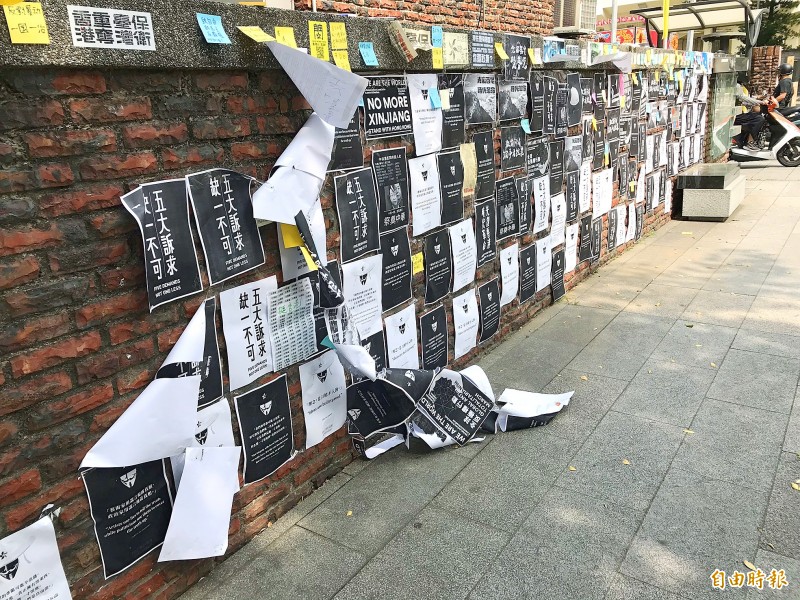《TAIPEI TIMES》 ‘Lennon wall’ incidents a sign of ‘anxiety’: professor

Posters dangle from a “Lennon wall” at National Cheng Kung University’s Kuang-Fu campus in Tainan on Tuesday. Photo: Liu Wan-chun, Taipei Times
DIPLOMACY: Academic exchanges are a way to win the approval of Chinese, so the defacing of the Lennon walls should be handled carefully, a university professor said
/ Staff writer, with CNA
The slew of incidents involving Chinese students vandalizing pro-Hong Kong democracy “Lennon walls” on campuses in Taiwan and threatening Hong Kong students are a manifestations of a collective anxiety, National Tsing Hua University professor Cheng Chih-peng (鄭志鵬) said yesterday.
Since Taiwan allowed Chinese students to study in Taiwan in 2011, they have never made such an aggressive political statement, not even during the Sunflower movement and Hong Kong’s “Umbrella movement,” Cheng said.
He cited three possible causes of anxiety among Chinese students in Taiwan.
First, Chinese President Xi Jinping (習近平) has been pushing the so-called “Chinese dream” since his rise to power, elevating Chinese ethnocentrism, he said.
With China’s rapidly growing economic power, ethnocentrism has prompted Chinese to seek recognition from the international community, he said.
However, some Chinese students studying abroad feel anxious, because many countries are not so friendly toward China, he said, adding that incidents of Chinese students seeking to impose their views on others have not only occurred in Taiwan, but also in Western countries.
Second, the anti-extradition bill movement in Hong Kong has showen many Taiwanese that Beijing reneged on the promise that it would maintain a “one country, two systems” policy there, which has increased Taiwanese’s distrust of the Chinese government, making unification with Taiwan even more unlikely, he said.
Third, Taiwanese students have become increasingly aware of the “Chinese factor” and more vigilant of China’s tactics to influence Taiwanese society, which is a source of contention between Taiwanese and Chinese students, especially during discussions of public affairs, Cheng said.
Regarding speculation that alleged vandalism of Lennon walls by Chinese students had been orchestrated, Cheng said that people should not view Chinese students as a group that cannot be reasoned with, but should try to understand what has made them anxious.
Cheng said he could not approve of the Ministry of Education leaving incidents of vandalism in the hands of universities.
The ministry should set a standard for dealing with such incidents to prevent inadequate policies being set by institutions, he said.
Cheng said he could not agree with Immigration Agency Director-General Chiu Feng-kuang’s (邱豐光) statement that if Chinese sabotage Lennon walls, they could be barred from re-entering the nation.
It is generally accepted that students should be given a second chance if they have made a mistake at university, so the authorities should not have a “double standard” on this matter, he said.
Puma Shen (沈伯洋), an associate professor in National Taipei University’s Graduate School of Criminology, said that similar incidents have occurred in other countries, so Taiwan needs to introduce a model to handle conflicts on campus to better manage risks.
The authorities should provide counseling to Chinese studying in the nation and help them form an understanding of the predominant public opinion to help them interact with classmates, Shen said.
Students from both sides should keep in mind that the point is to exchange ideas, which should be based on democratic values, he said.
If Taiwan cannot abide by democratic institutions, it would defeat the purpose of allowing in Chinese exchange students, he said.
Academic exchanges are a way for Taiwanese to win the approval of young Chinese, so the vandalism of the Lennon walls should not be treated in a manner that would only escalate hostility, he said.
新聞來源:TAIPEI TIMES













